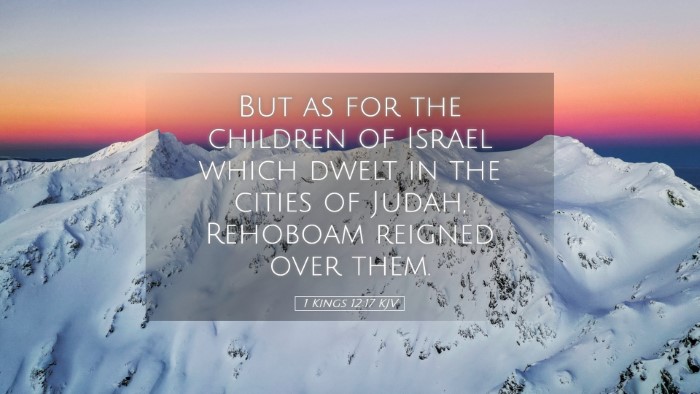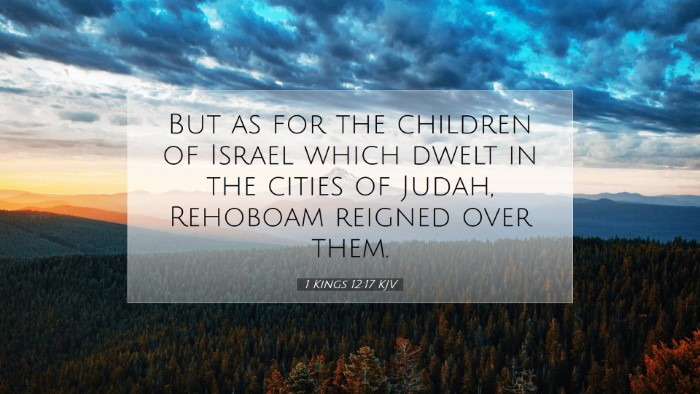1 Kings 12:17 Commentary
Verse Text: "But as for the children of Israel who dwelt in the cities of Judah, Rehoboam reigned over them."
Contextual Background
The narrative of 1 Kings 12 marks a pivotal moment in Israel's history, as it documents the division of the kingdom following the reign of Solomon. Rehoboam, the son of Solomon, ascends to the throne, yet his choices lead to a significant schism between the tribes of Israel.
This verse specifically highlights the division between the tribes of Judah and Israel, with Judah remaining loyal to Rehoboam while the other tribes choose to reject his rule.
Insights from Public Domain Commentaries
Matthew Henry
Henry underscores the significance of the tribal divisions initiated in this passage, emphasizing that Rehoboam's reign over Judah is indicative of God's sovereignty amidst human decisions. He notes that the loyalty of Judah, despite the surrounding contention, showcases the dynamics of divine Providence in the affairs of nations.
Henry points out that Rehoboam's harsh response to Israel's requests contributed significantly to the split. His insights reflect on the consequences of wisdom and foolishness in leadership, urging pastors and leaders to seek godly counsel over stubborn pride.
Albert Barnes
Barnes highlights the symbolic meaning of Judah as a representation of the Davidic line. He elucidates how this selection signifies God's promise to keep a remnant of His people under the righteous lineage of David. This commentary serves to remind theologians of the continuity of God's covenant with Israel, particularly through the tribe of Judah.
Furthermore, Barnes notes that the division could have been avoided had Rehoboam acted with humility and wisdom. He warns leaders of the pitfalls arising from a lack of understanding and compassion toward their constituents.
Adam Clarke
Clarke offers a detailed historical analysis, discussing the political implications of Rehoboam's reign and the rebellion of the ten northern tribes. He elaborates on the administrative changes that could have been enacted to maintain unity and peace amongst the divided nations.
Clarke remarks on the necessity of strong, compassionate leadership, suggesting that Rehoboam's failure to listen to wise counsel ultimately led to his loss of authority over Israel. He calls on contemporary believers to heed the lessons from Rehoboam’s decisions regarding governance and the importance of spiritual discernment.
Theological Implications
This verse and its surrounding context resonate deeply with themes of leadership, division, and divine purpose. The contrast between Rehoboam's harsh governance and the expectations of the people provides a critical framework for understanding the responsibilities of leadership in a faith community.
- Leadership Dynamics: The behavior of Rehoboam illustrates the impact of governance style on community cohesion. His choices evoke a warning for those in positions of authority to act justly and kindly.
- Divine Sovereignty: Despite the political upheaval, God’s purposes are ultimately fulfilled. The preservation of Judah serves as a reminder that God remains steadfast in His promises, even when His people stray.
- Community Response: The reaction of the Israelite tribes reflects the significance of communal input in leadership. This validates the call for leaders to engage in dialogue and heed the voices to whom they are accountable.
Application for Current Ministry
The principles derived from 1 Kings 12:17 remain relevant for today's church leaders and congregations. The emphasis on wise leadership and the consequences of choices made without seeking the counsel of experienced advisors underscores the importance of communal relationships within the church.
Pastors and theologians can draw from this narrative to:
- Encourage humility in leadership, recognizing the necessity for wisdom in decision-making.
- Assert the importance of nurturing the aspects of community that foster unity and prevent division.
- Emphasize the assurance of God’s promises in the midst of trials and conflicts, reminding believers of the hope found in steadfast faith.
Conclusion
In conclusion, 1 Kings 12:17 serves as a rich resource for theological reflection and practical application. The commentary insights provided from esteemed authors such as Matthew Henry, Albert Barnes, and Adam Clarke not only elucidate the historical context and significance of this passage but also highlight its enduring lessons for contemporary Christian leaders and scholars. The core messages of leadership, accountability, and divine sovereignty continue to resonate in today's fractured world, urging believers to seek wisdom and unity in Christ.


